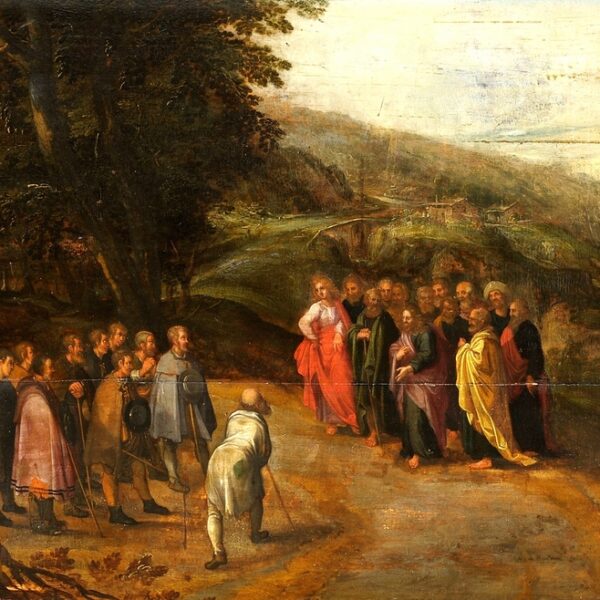Humanism: looming public enemy

Five Signs of the Last Days
July 25, 2020
A supernatural church or just another service club?
August 11, 2020To listen to this as a podcast, click here
“Most people are good deep down.”
“None of us can judge, because we don’t know what we’d do if we were in that situation.”
“Why can’t we all just get along?”
If you’ve heard any of those statements, you’ve heard the philosophy of humanism.
What is humanism?
Humanism is an outlook or system of thought attaching prime importance to human rather than divine or supernatural matters. Humanism stresses the goodness of human beings, the common needs they have, and seeks man-made ways to solve humanity’s problems.
Humanism advocates for unity and oneness. Now this is what Christ desired and prayed earnestly for in His church (John 17:20-23). The great difference between these two goals, however, is that humanism seeks unity apart from God.
I find it interesting during this time in history how we see messages proclaiming, “We’re all in this together” and signs outside local schools that say things like, “one tribe.” We want to believe that we’re in solidarity, that we all think and feel alike. And yet, despite these ideals, in spite of these proclamations of oneness, we’ve never been more splintered and fragmented.
Perhaps you’ve recently seen the signs in yards that say, “Be kind.” Well, that’s a good message, isn’t it?
The problem is, is anyone capable of fulfilling that exhortation — “be kind” — apart from Christ? What motivates someone to be kind, particularly in the face of a culture that is increasingly unkind?
Not long ago something horrific was reported in the news and a friend of mine on social media commented on it. “Be good humans, guys! Be good humans!” she implored.
Jeremiah 17:9 tell us that “The heart is deceitful above all things, and desperately wicked.” Our heart lies to us. It’s not just a little off, a little out of line. The Bible says it is terribly, atrociously, vilely diseased.
And that’s the trouble. There is nothing good in this world or in human nature apart from Christ. We only have degrees of evil. But we kid ourselves into thinking we are good people deep down because we compare ourselves to those who make chilling headlines and we congratulate ourselves on the fact that we are not like them. Any individual is capable of acting on the wickedness of his heart, whether it be adultery or letting a curse fly out his mouth or taking something that doesn’t belong to him. And then we justify it so that the evil doesn’t seem so bad.
But when we get a revelation of God as He really is, not how we project our human reasoning onto Him, we see ourselves in our true state. And it’s usually distressful.
Isaiah saw the Lord high and lifted up, and His glory filling the temple. And Isaiah’s reaction was what? He said, “Woe is me, for I am ruined! Because I am a man of unclean lips, And I live among a people of unclean lips; For my eyes have seen the King, the LORD of hosts” (Isaiah 6:5).
When Job encountered the manifest Lord, he said, “My ears had heard of You, but now my eyes have seen You. Therefore I retract my words, and I repent in dust and ashes.”…(Job 42:5-6, emphasis added).
Remember when Peter and the disciples fished all night but caught nothing, and at Jesus’ command they threw the nets over to the other side? The miraculous great catch of fish produced in Peter a revelation of Jesus that he prior to had not had, and the Bible says “He fell at Jesus’ feet saying, “Get away from me, Lord, for I am a sinful man!” (Luke 5:8).
John the revelator says that when he saw the glorified Christ, “I fell at His feet as one dead.” (Revelation 1:17).
One of the reasons we need this great revelation of our Lord is so that we can see everything else, including ourselves, in its true state.
Humanism and The Tower of Babel
Humanism shows up early on mankind’s scene in Genesis 11:
“Now the whole earth had one language and few words. And as men migrated in the east, they found a plain in the land of Shinar and settled there. And they said to one another, ‘Come, let us make bricks, and burn them thoroughly.’ And they had brick for stone, and bitumen for mortar. Then they said, ‘Come, let us build ourselves a city, and a tower with its top in the heavens, and let us make a name for ourselves, lest we be scattered abroad upon the face of the whole earth.’” (Genesis 11:1-4 RSV).
The plain of Shinar lay between the Tigris and Euphrates rivers. The name, Shinar, indicates to us that these people were Hamites, descendants of Noah’s son Ham, because in Chapter 10 we were told it was the Hamites who settled in the land of Shinar of Babylonia (or Mesopotamia, as we know it today).
Archaeologists digging in the Mesopotamian region discovered some years ago certain towers that early Babylonians had built. They are known as ziggurats, and were built in a circular fashion with an ascending staircase, culminating with a shrine at the top.
The late Bible teacher Ray Stedman notes that “the inventiveness of the Hamitic people becomes evident…these were technologically gifted people. Their native inventiveness becomes evident in the way they adapted to the environment in which they lived…They did not find rocks and stones to build with, such as they had in the land where they had previously lived, so they made bricks out of dirt and clay. Later they discovered the process of burning them — first in the sun, and then in a furnace — until they became hard and impermeable brick such as we know it today.
“All this is given to us in one sentence in the Bible, but we know from history that it occupied a period of time. Man did not discover all this at one time but learned how to make bricks and later how to burn them. They also lacked lime for cement so could not make mortar, as we know it, but some inventive [soul] among them discovered a tar pit which was filled with natural asphalt (these are common throughout the Middle East). They discovered that the tar was sticky and they used this natural bitumen, this asphalt, for mortar. They had then a substitute for stones and cement. They made bricks and used asphalt for mortar and thus demonstrated how adaptable they were to the situation they found.”
Stedman goes on to note that “their success in doing these things fired their ambition. This almost always happens. When they discovered that they could use other than natural materials for building, but could invent their own, they were fired with desire to put these to work. They began to talk excitedly about building a city and a tower.” (Ray Stedman, “Understanding Society.”)
Now you might ask, “What’s the crime here? What was the sin in all of this?”
The answer lies in verse 4, “Come, let us make a name for ourselves.” The idea is not that name of the Lord is lifted up, but that a name is given to the people. To humankind.
Does any of this sound familiar to you? Are we seeing today a relationship between technological advances and a push for ideas that exalt themselves above the knowledge of God?
Humanism in the church: keeping God in a corner
We see humanism at work in the secular world, in our education system and in the and we see it science and all over Hollywood in the expectation that celebrities have to be worshiped and how the media helps them to achieve this. We see humanism in the arts and in politics. But what about the church? Do you see humanism at work?
We took a couple of road trips this summer across the Commonwealth of Pennsylvania, and we were in towns and cities all across the state. And you can tell something of what’s going on inside the church by the signs you see outside it, can’t you?
It’s my observation, based on the dozens and dozens of churches we drove by in the last month, that many, if not most, churches are mimicking the secular world around them, rather than trailblazing the kingdom of heaven into our culture.
A word I see lot outside churches is “peace.” Well, there’s no peace outside of knowledge of the Prince of Peace. That message needs to be clear. The kingdom of heaven is righteousness, joy, and peace in the Holy Ghost. If the Holy Spirit isn’t present, there’s no peace. And as Bible teacher Derek Prince once pointed out, righteousness precedes peace in that verse. If you’re not living a righteous life in Christ, you are not going to enjoy peace.
Another sign I saw outside churches and even in yards was the phrase, “Love Thy neighbor.” Well, that sounds pretty Biblical. In fact, it is Biblical. So what’s the problem?
Well, the phrase “Love Thy Neighbor” is being used to push political agendas. In fact, one church in particular we drove by went on to say that you were not loving your neighbor if you didn’t comply with certain behaviors that, up to a few months ago, were virtually unheard of here in the States.
“Love Thy Neighbor” is being bandied about by media personalities who openly mock Christians and hate the name of Jesus. Just like the voices that haven’t cracked open a Bible in decades perhaps, if ever, they all know the verse, “Do not judge.” Because it fits an agenda and therefore they can quote it and thus manipulate, they figure, simpleminded Christians into compliance.
Pastor Jake Kail of Lancaster pointed out recently that the first commandment is to love the Lord Your God with all your heart and with all your soul and all your mind and all your strength. The second commandment is to love thy neighbor as thyself. If you take the second commandment without practicing the FIRST commandment, you end up with humanism.
I’ll say that again. If you preach and practice the second commandment, “Love Thy Neighbor” without practicing and preaching the first commandment to love the Lord with all your heart and all your soul and all your mind and all your strength, you end up with humanism.
Hearing from Heaven
There’s very much a thought-process in the western church that we the humans will decide how we want our services to look, how long we want them to go (down to the minute), and we will put into place programs that minister to the needs of other humans.
You might say, “What else would we do? How should we operate?”
Well, scripture gives us a blueprint.
First of all, Jesus said, “My house shall be called a house of prayer for all nations.” Catch that? God’s house is a house of prayer. Again, deferring to the insight of my friend Pastor Kail, “If there isn’t prayer in the church, then it isn’t really God’s house.”
Remember that the early church “devoted itself to the Apostles teaching, and to fellowship (that is getting together, assembling, not social distancing, to the breaking of bread, and to prayer.” They devoted themselves, or spent all their time, in these four pursuits.
The great commission of Paul and Barnabas being sent to the Gentiles, on which the faith of our entire civilization is predicated, including your salvation and mine, was preceded it says by “the Apostles ministering to and fasting before the Lord” (Acts 13:2). It was only after they had first ministered to the Lord did He speak and tell them the great Mission on which they were to embark.
Likewise, our Lord Himself was always going away some place private to pray. You hear a good bit of talk in the church about being like Jesus. Well, if you’re like Jesus at all, first and foremost, you’re always taking time to pray. Sometimes alone, and sometimes with other disciples of His.
Leonard Ravenhill said he could tell you the size of a man by the kind of prayer life he had.
I appreciate how the leaders at the church where I attend are very involved, very visible in the community. But they also have a vibrant, near constant, prayer life. There’s prayer in the sanctuary before our church service begins. We pray during the service together and often at altar calls following. There are prayer groups that meet throughout the week and corporate prayer Wednesday evenings. We regularly pray with our international brothers and sisters on social media and with those across the states on teleconference calls.
See, prayer isn’t just us crying out to God, as vital as that is. Prayer is also hearing from the Lord. What does He want us to do? How does He want to be worshiped? Should we hold Sunday evening services outside our church building or in the Community Park? Which ministries does He want us to support and how does He want us to appropriate the tithes and offerings? How do we help this family with its unique situation? What does He want His church to look like amid the fears and what-ifs of a virus that’s been hijacked by the media and by certain politicians to propagate all kinds of fear?
These would be impossible questions for us as humans without the Lord’s wisdom. Without hearing from Heaven, how could we possibly move forward in confidence that we were doing the right thing? How do we have any fruitfulness apart from Him?
See, my experience from being in many churches is that we put forth our best ideas and we call on God to bless them. And then we relegate Him back to the corner we’ve saved for Him and we keep on with our man-made plans. We want to be safe. Because we have this idea that we need to be foremost pleasing to others (that’s humanist philosophy) and the Lord might do something that’s uncomfortable. Or downright offensive.
Even our worship – have you ever noticed how much of contemporary Christian music is me-centric in nature? “Lord bless me. Lord, I’m in a bad way but you’ll meet my need. Lord, I keep slipping and falling but it’s okay because You never give up on me.”
I’ve noticed a significant difference in services where the worship is centered on Jesus Christ instead of human frailty. When He is lifted up, He will draw all men unto himself, scripture says. When He is elevated in worship, our own joy is as well.
“Lean not on your own understanding,” Proverbs 3:5 tells us. For what’s ahead, what is coming, we dare not. “Trust in Jehovah with all your heart.” In other ways, rely on Him completely. “In all your ways acknowledge Him, and He will direct your paths.” Submit to Him completely.
It’s the only way. Remember the old hymn, “Trust and Obey” – “But we never can prove the delights of His love/Until all on the altar we lay.”
A word for someone
I want to put this out to you who are reading this; I’ve a strong sense that someone needs to hear this. Perhaps you are struggling with staying at a church where you’re not sure that God is being given His due place of worship and majesty. Perhaps His holiness is not emphasized. The simple message of the cross has been distorted. I believe there are many Christians out there who are sitting week after week discomfited or dissatisfied in some way, and maybe you feel guilty about that. Perhaps you’ve attended this church most of your Christian life and you guilty to leave.
If this is you, I am asking that you put your feelings before the Lord and ask Him what He would have you do. If you’re to stay, that He’d give you grace, and if you’re to go, that He’d give you courage. That He would open doors. And I am praying that you have release to assemble with other believers who are going after Him wholeheartedly, in truth and in righteousness and in grace. Not that they are perfect. But we need the fire of God to cleanse us and to embolden us and to free us to free others.
And we need, more than ever, to walk with Him in such a way as not to fall away in these Last Days.





